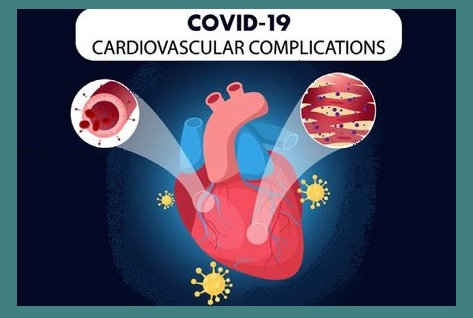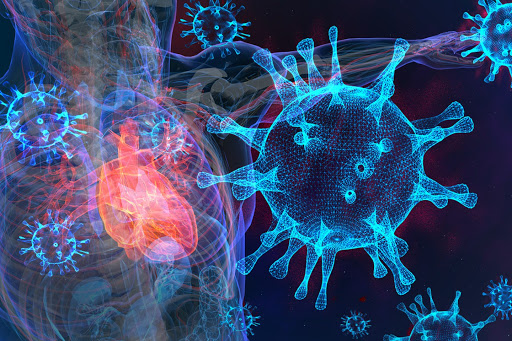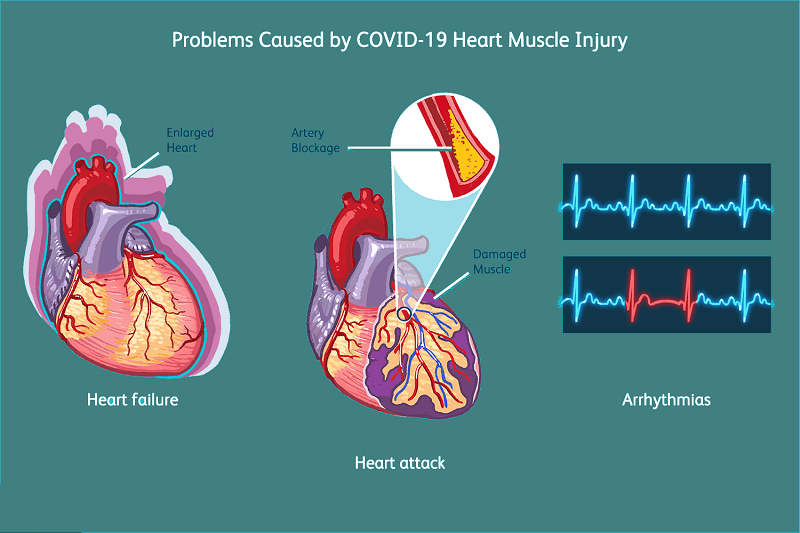RESTORATION OF THE CARDIOVASCULAR SYSTEM AFTER CORONAVIRUS INFECTION COVID-19
Recent studies of COVID-19 have shown that the SARS-CoV-2 virus in patients with concomitant chronic cardiovascular diseases causes a severe form of atypical pneumonia, at that the course of the disease is extremely severe, and long-term consequences can lead to damage to the heart muscle, the occurrence of arrhythmias, cardiac insufficiency, general weakness, rapid fatigue, cognitive impairment and many other pathological changes. An acute inflammatory process in the vessels activating the formation of blood clots also plays its negative role, because it leads to the occurrence of heart attacks and strokes.
In case of Coronary Heart Disease, the respiratory and vascular system affected by COVID-19 dramatically reduces the "delivery" of oxygen through the coronary arteries to the myocardium, which leads to a violation of the pumping function of the heart. And an acute sudden occlusion (or complete blockage of the vessel lumen by a thrombus), resulting from rupture of an atherosclerotic plaque, leads to the death of an area of the heart muscle, and thus - to the development of myocardial infarction.

In patients with Chronic Heart Failure, pulmonary embolism and increased respiratory failure lead to cardiovascular decompensation, and fever may occur. An increase in edema, shortness of breath, a decrease in blood pressure, blood thickening, and dizziness are observed; patients may have a need to constantly take a sitting position during sleep at night. Disappointing statistics show that the fatal consequences of COVID-19 damage occur in more than half of patients with chronic heart failure.
Patients with Arterial Hypertension after COVID-19 infection observe an excessive decrease in blood pressure, less than 110/60 mm Hg. This can provoke cerebral ischemia, cause a stroke and instantly worsen the prognosis. The pathological effect of COVID-19 on patients with arterial hypertension leads to irreversible changes in the vascular wall, including the kidneys, leading to a decrease in the number of filtering glomeruli (nephrons) and the development of renal failure.
Moreover, COVID-19 negatively affects the blood itself. The coronavirus “attacks” the hemoglobin in RBC and makes them unable to transport oxygen to the cells. This, in conditions of severe pneumonia and the addition of a bacterial infection, leads to the development of sepsis, thrombus formation in the heart vessels, disruption of the blood supply to the myocardium, increased release of inflammation factors and stress hormones.
The latest studies conducted by American scientists have established that in the severe course of the disease caused by the SARS-CoV-2 virus, not a typical myocarditis (a lesion of inflammatory nature) develops in the heart muscle, but a unique death of individual cells. It has been established that the COVID-19 virus does not affect the cells of the heart muscle itself, but is located in the cells of small blood vessels, causing damage to the vascular endothelium (their inner lining).
All this testifies to the mortal danger for the human body of complex damage to the myocardium, coronary vessels and blood, which develops in the process of the COVID-19 disease and its consequences.

The obtained research results ensured the development of new and unique methods of treatment of pathological changes caused by COVID-19, and helped to achieve successful results in the fight against cardiovascular complications of the disease and its consequences. The doctors of the Unique Cell Treatment Clinic in the shortest possible time have developed and implemented a comprehensive treatment aimed at protecting the cardiovascular system during the period of illness, as well as powerful restorative treatment after.
The Unique Cell Treatment Clinic offers a comprehensive treatment with fetal stem cells for various cardiovascular complications associated with COVID-19.
Fetal stem cells are able to differentiate into different types of cells, including cardiomyocytes, creating new areas of healthy tissue in the heart myocardium. Our treatment gives the maximum positive effect and is especially relevant in patients who have had myocardial infarction with the formation of postinfarction cardiosclerosis or chronic heart aneurysm. Stem cells are also able to stimulate the development of additional vascular collaterals by forming and growing the inner lining of blood vessels, instead of damaged by the SARS-CoV-2 virus. This allows to restore nutrition to ischemic tissues. Due to the metabolic abilities of fetal stem cells, after our treatment, the level of atherogenic lipoproteins in blood involved in the development and progression of atherosclerosis, the formation and increase of atherosclerotic plaques significantly decreases. In the process of treatment, we also administer fetal stem cells-precursors of hemoglobin; this allows to significantly increase the transport of oxygen in the body, to avoid the development of necrosis, sepsis and other complications.

Comprehensive treatment of complications of COVID-19 using preparations based on fetal stem cells, offered by UCTC, significantly reduces the severity of clinical manifestations of the disease, shortens the duration of the severe phase and developing cardiac complications, decreases the frequency and strength of anginal attacks, increases tolerance (endurance) to physical loads. Such manifestations of congestive heart failure as shortness of breath, general weakness, rapid fatigue, palpitations, and swelling are decreased. Stem cell treatment also gives a pronounced positive effect in the correction of risk factors for the development of coronary heart disease and atherosclerosis, such as high blood pressure, diabetes mellitus and dyslipoproteinemia, therefore it is an excellent prevention of cardiovascular and cerebrovascular accidents. Specialists of the UCTClinic observe in dynamics and conduct clinical (laboratory-instrumental) monitoring of patients after treatment.
After fetal stem cell treatment, our patients with cardiac complications after COVID-19 experience significant clinical improvements:
1. Improvement of blood counts, increase in hemoglobin level. The normal oxygen supply to the whole body is restored.
2. The inner lining of blood vessels, including coronary arteries, is restored. The development of additional vascular collaterals of the microcirculatory bloodstream occurs, providing trophism and oxygen delivery to all tissues and organs experiencing hypoxia.
3. New areas of healthy myocardial tissue are formed, improving the contractile function of the heart. This is especially relevant after a myocardial infarction.
4. Decrease in the manifestations of symptoms of heart and lung failure: general weakness, shortness of breath, palpitations, rapid fatigue on physical exertion, edema of the lower extremities, etc.
5. The content of "bad" cholesterol decreases, thereby preventing the development and progression of atherosclerotic plaques in the vessels of the heart and brain. The body's resistance against heart attack and stroke is strengthened.
Treatment with use of fetal stem cells is outpatient and easily tolerated by patients. Stem cells are administered intravenously or subcutaneously. The treatment course takes 2-4 days depending on the severity of the disease.
